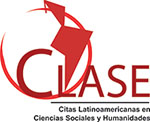Neurolinguistic programming techniques in the development of speaking skill
DOI:
https://doi.org/10.23857/dc.v7i5.2304Palabras clave:
Neurolinguistics, programming, techniques, speaking skillsResumen
The main objective of this research was to determine the influence of Neurolinguistic Programming Techniques in the development of Speaking Skills, given that the students from 2nd BGU of the Unidad Educativa PCEI Juan León Mera could not express themselves correctly orally, using incorrect sentences with little use of vocabulary and no comprehension. It is in this context that this experimentation was proposed to be carried out with 30 students. A single group pre-test and post-test design was adopted for this study. The students' problems in the development of speaking skills were evaluated using the SPSS statistical program, applying the statistical test T student of related tests. Based on the results of the pretest, Neurolinguistic Strategies (Anchoring, Creating rapport, Mirroring, Maintaining the flow) were applied for 4 weeks during English classes. At the end of the application, a posttest was applied, and the result of the study revealed that students taught through neurolinguistics strategies had significant improvements in speaking skills.Citas
Ahmad, Y. B. (2018). NLP MODELLING TECHNIQUE IN REDUCING PRONUNCIATION. English Language Teaching and Research, 2(1), 298–306. http://ejournal.unp.ac.id/index.php/eltar/article/view/102674
Alamdar, F. S., & Karbalaei, A. (2015). The Relationship between Neuro-Linguistic Programming and Anxiety and Self-Esteem among Iranian Intermediate EFL Learners. International Journal of Educational Investigations, 2(8), 108–130. https://www.semanticscholar.org/paper/The-Relationship-between-Neuro-Linguistic-and-and-Alamdar-Karbalaei/e16b7ca6c8ac8c6e58fd8fb84180363e6dbb0f9e
Alroudhan, H. (2018). The Effect of Neuro-linguistic Programming Coaching on Learning English. International Journal of Applied Linguistics and English Literature, 7(4), 184. https://doi.org/10.7575/aiac.ijalel.v.7n.4p.184
Arjualayana, Rafli, Z., & Ansoriyah, S. (2019). Neuro-Linguistics Programming Concept For Teaching Productive Skill Arjulayana1,. ELS Journal on Interdisciplinary Studies on Humanities, 1(November 2018), 232–239.
Ayesha, S. (2016). Augmenting Academic Speaking at the Tertiary Level through Neuro-linguistic Programming (NLP). The Global Journal of English Studies, 1(1), 1–24. http://thegaes.org/files/documents/GJES-Feb-16-Ayesha-Salma.pdf
Caballero, D. R., & Rosado, N. (2018). Neurolinguistic Programming and Regular Verbs Past Tense Pronunciation Teaching. English Language Teaching, 11(11), 1. https://doi.org/10.5539/elt.v11n11p1
Carey, J., Churches, R., Hutchinson, G., Jones, J., & Tosey, P. (2018). Neuro-linguistic programming and learning: teacher case studies o the impact of NLP in education. Theory and Practice in Language Studies, 6(10), 181–184. https://doi.org/10.7575/aiac.ijels.v.6n.1p.79
Cox, E., Bachkirova, T., & Clutterbuck, D. (2014). No TitleThe Complete Handbook of Coaching (SAGE). https://books.google.com.ec/books?id=6qyHAwAAQBAJ&printsec=frontcover&hl=es&source=gbs_ge_summary_r&cad=0#v=onepage&q&f=false
Dagbaeva, O., Dmitrieva, E., & Usmanova, Z. (2018). the Innovative Ways of Learning a Foreign Language Using Neurolinguistic Approach. EDULEARN18 Proceedings, 1(July), 1424–1428. https://doi.org/10.21125/edulearn.2018.0449
Farahani, F. (2018). The Effect of Neuro-Linguistic Programming (NLP) on Reading Comprehension in English for Specific Purposes Courses. International Journal of Education and Literacy Studies, 6(1), 79. https://doi.org/10.7575/aiac.ijels.v.6n.1p.79
Fidinillah, M. (2018). The Effects of Neurolinguistic Programming (NlP) Methods Towards Students’ Speaking Skill. Scope : Journal of English Language Teaching, 2(01), 56. https://doi.org/10.30998/scope.v2i01.2273
Hamid, M., & Marzieh, A. (2017). The Impact of Neurolinguistic Programming on EFL Teachers’ Reflective Teaching. I-Manager’s Journal on English Language Teaching, 7(3), 22. https://doi.org/10.26634/jelt.7.3.13589
Ilyas, M. (2017). Finding Relationships between Acquisition of Basic Skills and Neuro-linguistic Programming Techniques. An International Peer-Reviewed Journal, 34(2003), 22–26. www.iiste.org
James, W. (2007). The Principles of Psychology. In The Principles of Psychology (2nd ed., pp. 15–17). Cosimo. https://books.google.com.ec/books?hl=es&lr=&id=11gUsvvfrYUC&oi=fnd&pg=PA1&dq=principles+of+psychology+william+james&ots=EyZueZKHa-&sig=7s9vVs4ytxQ_gVyMZA4lz3tyigY#v=onepage&q=principles of psychology william james&f=false
Keezhatta, M. S. (2019). The Impact of Neuro-Linguistic Programming on English Language Teaching: Perceptions of NLP-Trained English Teachers. International Journal of English Linguistics, 9(6), 454. https://doi.org/10.5539/ijel.v9n6p454
Khalandi, C., & Zoghi, R. (2017). The Effect of NLP (Accelerated Learning) on Iranian EFL Learner’s Listening Comprehension. Theory and Practice in Language Studies, 7(11), 1139. https://doi.org/10.17507/tpls.0711.25
Korzybski, A. (2013). GENERAL SEMANTICS (p. 435). S & S. file:///C:/Users/cliente/Downloads/GENERAL_SEMANTICS.46.pdf
Lashkarian, A., & Sayadian, S. (2015). The Effect of Neuro Linguistic Programming (NLP) Techniques on Young Iranian EFL Learners’ Motivation, Learning Improvement, and on Teacher’s Success. Procedia - Social and Behavioral Sciences, 199, 510–516. https://doi.org/10.1016/j.sbspro.2015.07.540
Ningsih, M. (2016). IMPROVING STUDENTS’ SPEAKING SKILL USING NEUROLINGUISTIC PROGRAMMING TECHNIQUE. Revista Brasileira de Ergonomia, 9(2), 10. https://doi.org/10.5151/cidi2017-060
Oviedo, T. (2007). Interaction in communication. In Interaction in communication (Universida, p. 120).
Pashler, H., Mcdaniel, M., Rohrer, D., & Bjork, R. (2009). Learning Styles. Psychological Science, 9(3), 105–119. http://psi.sagepub.com/content/9/3/105.abstract
Perls, F. (1993). Key Figures in Counselling and Psychotherapy (SAGE)
Pourbahreini, F. (2015). The Effect of Neuro-Linguistic Programming Technique on Enhancing Grammatical Knowledge of Iranian EFL Learners at Intermediate Level. English for Specific Purposes World, 44(16). https://www.semanticscholar.org/paper/The-Effect-of-Neuro-Linguistic-Programming-on-of-at-Pourbahreini/c388188112d296b66666b23d1f6bce040169c8bf?p2df
Ramganesh, E., & Paulraj, I. J. M. (2016). Effectiveness of Technology Enabled Psycho-NLP on the Performance of High School Students in Spoken English. 1(2), 37–44. https://doi.org/10.20849/ajsss.v1i2.54
Rustan, E. (2019). LEARNING CREATIVE WRITING MODEL BASED ON NEUROLINGUISTIC PROGRAMMING. Journal of Chemical Information and Modeling, 53(9), 1689–1699. https://doi.org/10.1017/CBO9781107415324.004
Tarasinska, J. (2016). SHAPIRO – WILK TEST WITH KNOWN MEAN. 14(1), 89–100.
Yameen, A., & Iftikhar, L. (2014). Neurolinguistic Programming as an Instructional Strategy to Enhance Communicative Competence of Language Teachers. Journal of Applied Environmental and Biological Sciences, 4, 331–336. https://www.textroad.com/pdf/JAEBS/J. Appl. Environ. Biol. Sci., 4(7S)331-336, 2014.pdf
Watzlawick, P., Beavin, J., & Jackson, D. (2011). Pragmatics of Human Communication (W. Norton (ed.)). Norton & Company. https://books.google.com.ec/books?id=Ob9UAgAAQBAJ&dq=paul+watzlawick+communication+theory&lr=&hl=es&source=gbs_navlinks_s
Publicado
Cómo citar
Número
Sección
Licencia
Authors retain copyright and guarantee the Journal the right to be the first publication of the work. These are covered by a Creative Commons (CC BY-NC-ND 4.0) license that allows others to share the work with an acknowledgment of the work authorship and the initial publication in this journal.






